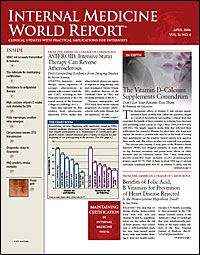Publication
Article
Internal Medicine World Report
Benefits of Folic Acid, B Vitamins for Prevention of Heart Disease Rejected
Author(s):
Is the Homocysteine Hypothesis Dead?
ATLANTA—The idea that re?ducing plasma homocysteine levels with folic acid and ?vitamins B6 and B12 supplementation can also reduce the risk of heart disease, once considered a well-established truth, has now been turned upside down, with new studies ?show?ing it does not benefit cardiovascular (CV) health, ac?cord?ing to data presented at the 55th annual scientific session of the Amer?ican College of Cardiology that were simultaneously published in the rapid online edition of the New England Journal of Medicine (doi:10. 1056/NEJMoa060900).
In the Heart Outcomes Prevention Evaluation (HOPE)-2 trial, daily use of 2.5 mg of folic acid, 50 mg of vitamin B6, and 1 mg of vitamin B12 for 5 years decreased homocysteine levels in patients at increased risk for CV disease but did not reduce the ?incidence of major CV events.
“The failure to detect a difference in the risk of cardiovascular death in patients using the vitamin B regimen and patients on a placebo diet means that greater attention should be focused on established treatments for secondary prevention,” said lead investigator Eva Lonn, MD, of McMaster University, Toronto, Canada. “We have often been derailed in our efforts to implement secondary prevention adequately, and the focus should be on what has been proven to work, namely, a healthy lifestyle, including fruits and vegetables, exercise, and for those who already have had an event, certain drugs such as aspirin, beta-blockers, and angiotensin-converting-enzyme in?hibi?t?ors, which have proven benefit.”
Dr Lonn and colleagues randomized 5522 patients to the vitamin B/folic acid regimen or placebo for a mean of 5 years. All participants were at least 55 years old and had chronic stable vascular disease or diabetes and additional risk factors for atherosclerosis.
Numerous epidemiologic studies have identified an independent and graded association between homocysteine concentration and CV risk. Thus the use of vitamin B and folic acid supplements had been proposed as a means of preventing myocardial infarction (MI) and stroke in high-risk patients, because they reduce homocysteine levels. A simple, safe, and ???inexpensive therapy, such as vitamin ?sup?ple?men?tation, is ap?pealing, Dr Lonn explained.
The primary outcome measure in HOPE-2 was the composite of death from CV causes, MI, and stroke.
Key points
In patients with CV disease, vitamin B supplementation reduces homocysteine levels.
However, supplementation does not significantly lower CV disease risk.
The focus of primary prevention should be on a healthy lifestyle.
Drugs with proven efficacy should remain the foundation of secondary prevention.
Mean plasma homocysteine levels decreased by 0.3 mg/L in the combination supplement group and increased by 0.1 mg/L in the placebo group. Primary outcome events occurred in 519 (18.8%) patients in the active therapy group and 547 (19.8%) in the placebo group(P = .41).
Compared with placebo, active treatment did not significantly reduce the risk of death from CV disease (relative risk, 0.96), MI (relative risk, 0.98), or any of the secondary outcomes.
Fewer patients assigned to folic acid and vitamin B supplementation had a stroke, but more of these patients also had to be hospitalized because of unstable angina.
Dr Lonn noted that these findings are supported by the Norwegian Vitamin (NORVIT) trial, which was also ?published online in the New England Journal of Medicine (doi: 10.1056/NEJM oa055227). The NORVIT trial found no appreciable benefits with combined folic acid and vitamin B12 supplementation, with or without the use of vitamin B6, despite adequate homocysteine ?lowering.
“Overall, we cannot recommend the use of folic acid and B vitamin ?supplements as a preventive treatment,” she said.





